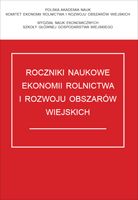Main Article Content
Article Details
Atie K. 1995: Environmental marketing Management: Meeting the Green Challenge, London, Pitman Publishing, 128.
Borguľa M. 2011: Ekologický marketing: príležitosť pre inováciu, cit. 11.09.2012, Dostupné z http://of.euba.sk/zbornik2011/ZBORNIK %20VEDECKYC H%20STATI %202011-PDF /KMR /BOR GU%C4%BDA _M._KMR.pdf
Charter M. 1992: Greener Marketing: A Greener Marketing Approach to Business, Sheffield, UK, Greeanleaf Publishing, 58.
European Commission 2010. Making Sustainable Consumption and Production a Reality, [In] A guide for business and policy makers to Life Cycle Thinking and Assessment, Luxembourg, Publications Office of the EU, 2012, 29.
Havlíková J. 2007: Trvalo udržateľný rozvoj v medzinárodnom kontexte, cit. 11.4.2007, http://www.tur.sk/index.stm?apc=0-79efcdc8d3c1e81704b24af08cdc6376-1-1&x=72631
Kubicová L. 2008: Vývoj spotrebiteľského dopytu po potravinách, Vedecká monografia, Nitra, SP U, 85.
Mičeková E. 2012: Analýza spoločenskej zodpovednosti v potravinárskom priemysle na Slovensku, Dizertačná práca, Nitra, SP U, p. 82.
Mura L., Grublová E., Gecíková I., Kozelová D. 1995: Analýza modelov internacionalizácie podnikania, Studia Oeconomica Universitatis Babes Bolyai.
Peatie K. 1998: Environmental marketing Management: Meeting the Green Challenge, USA, Pitman Publishing, 309.
Prokeinová R. 2010: Využitie SASu ako nástroja kvantitatívnych analýz v dotazníkovom prieskume. In SAS Fórum publication. Praha: SAS, 2010. [cit. October 12-2012]. Dostupné na < http://www.sas.com/offices/europe/czech/events/2010/sas_forum/posters/Poster_Prokeinova.pdf>
Remišová A. 2011: Etika a ekonomika, [in] Analýza spoločenskej zodpovednosti v potravinárskom priemysle na Slovensku, Mičeková E. (ed.), Dizertačná práca, Nitra, SP U, p. 82.
Ubrežiová A., Ubrežiová I., Horská E. 2012: Corporate social responsibility implementation in international management; a way to increase competitiveness of a company. In Management - Leadership - Strategy - Competitiveness. Gödöllő: Szent István University, 93-100.
World Business Council For Sustainable Development. 2008: Sustainable Consumption Facts and Trends. From a business perspective. The Business Role Focus Area, Switzerland, Atar Roto Presse SA, 38.
Downloads
- Marzena Trajer, Krystyna Krzyżanowska, “SCHOOL FRUIT SCHEME” – IMPLEMENTATION AND EFFICIENCY IN SHAPING CHILDREN`S DIETARY HABITS , Annals of Agricultural Economics and Rural Development: Vol. 99 No. 2 (2012)
You may also start an advanced similarity search for this article.




